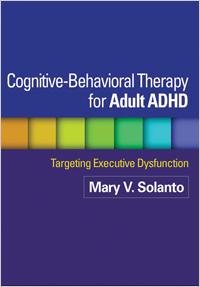
Mary V. Solanto, Ph.D., is associate professor of psychiatry and director of the ADHD Center in the Division of Child and Adolescent Psychiatry at Mount Sinai School of Medicine in New York City. Dr. Solanto has worked extensively with adults and children with ADHD. Her research and publications address the cognitive and behavioral functioning of individuals with ADHD, the effects of psychostimulants, and the characteristics of the predominantly inattentive subtype of ADHD.
Dr. Solanto is active in the training of psychiatrists and psychologists to diagnose and treat ADHD and related disorders. She serves on the editorial board of the Journal of Attention Disorders and the advisory board of the Journal of Child Psychology and Psychiatry. Dr. Solanto is the author of Cognitive-Behavioral Therapy for Adult ADHD: Targeting Executive Dysfunction (2011).
 In your book Cognitive-Behavioral Therapy for Adult ADHD: Targeting Executive Dysfunction, you describe a 12-session treatment program for adult ADHD. What aspects of cognitive behavioral therapy are the most helpful to adults with ADHD?
In your book Cognitive-Behavioral Therapy for Adult ADHD: Targeting Executive Dysfunction, you describe a 12-session treatment program for adult ADHD. What aspects of cognitive behavioral therapy are the most helpful to adults with ADHD?
The most helpful aspects of the treatment include, first, the mutual support of the group members, and the opportunity to learn they are not alone in confronting these problems. Secondly, participants benefit by learning specific skills and strategies -- ways to manage time, organize, and solve problems. These components together help the participants to develop new hope and confidence in managing their lives and achieveing their goals.
How much does the structured nature of the 12-session cognitive-behavioral treatment model help adults with ADHD?
We conducted a rigorous scientific study to quantify the benefit that adults derive from the treatment. [1] In this study, sponsored by the National Institute of Mental Health, adults with ADHD were randomly assigned to receive either the CBT program or a support group. A support group was included in order to determine how much benefit the active treatment provided over and above the attention and support of the therapist and group members. The results revealed clinically meaningful improvement in the treated group that was statistically superior to that in the support group.
In your book, you state that these 12 steps can be adapted for individual therapy. Is there a difference in the efficacy of group cognitive-behavioral therapy vs. individual cognitive-behavioral therapy for adult ADHD?
There has not yet been a head-to-head study comparing group and individual therapy. However, our clinical experience indicates that for many people the group treatment offers benefits that individual treatment does not -- in particular, as described, with respect to the support of, and interaction with, other group members. The groups develop a positive esprit de corps that helps to motivate and carry the participants along.
Are there any adults with ADHD for whom cognitive-behavioral therapy is contraindicated?
There are some co-existing disorders that should take precedence with respect to treatment before the adult with ADHD would be ready to optimally benefit from CBT for ADHD. These conditions include severe depression, severe anxiety, active substance or alcohol abuse, and borderline personality disorder. People with significant problems of anger management would also likely do better in individual rather than group treatment. It should be noted that specific forms of CBT are available to treat these conditions as well.
Please explain the importance of ADHD adults creating a structured schedule for themselves.
Everyone needs to have some structure or plan for the day in order to be optimally effective in achieving goals. Adults with ADHD have difficulty in setting up and maintaining this structure because they are easily distracted by many outer and inner stimuli and impulses and are unaccustomed to planning. That is why we devote considerable effort in the program to the regular use of a planner for scheduling activities and tasks, as well as prioritizing and planning activities for the day, week, month, or longer, and remaining focused on long-term goals.
Where can adults with ADHD locate a cognitive-behavioral therapist or treatment program?
Because this treatment was only recently developed, there are few practitioners available outside the established programs in New York (Mount Sinai), Boston (Mass General) and Philadelphia (U Penn). Adults with ADHD may be able to locate a cognitive-behavioral therapist or a neuropsychologist who is amenable to working with the published CBT-ADHD manuals for therapists. Listings of potential therapists are available through CHADD (CHADD.org) and through the professional Association for Behavioral and Cognitive Therapies (ABCT.org).
What is one main point you would like readers to know about cognitive-behavioral therapy for the treatment of adult ADHD?
I think it is important for the potential participant to be aware that he greater the effort invested in the treatment program, the greater the pay-off. Our efficacy study clearly showed, for example, that the greater the number of weekly home exercises completed by the participant, the greater the overall benefit he or she derived from the program. Just like learning to play an instrument, or learning a new language, or developing a muscle, learning new habits of the mind requires continued practice.
www.stephaniesarkis.com
Copyright 2012 Sarkis Media LLC
1. (Reference: Solanto et al. American Journal of Psychiatry. 167 (2010) 958-968.)
For more by Stephanie Sarkis, Ph.D., click here.
For more on ADHD, click here.